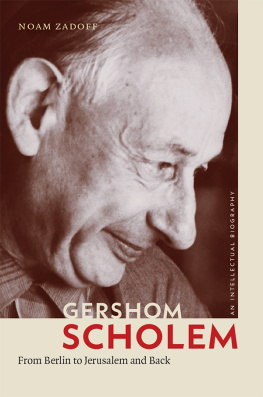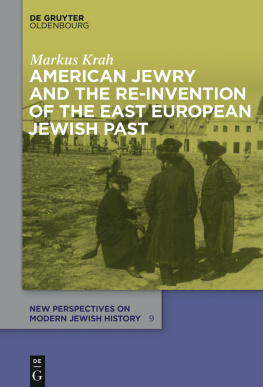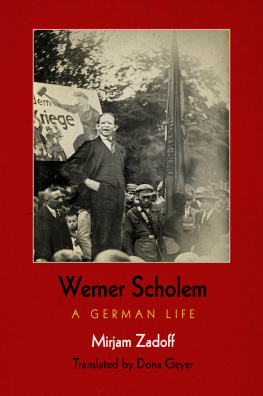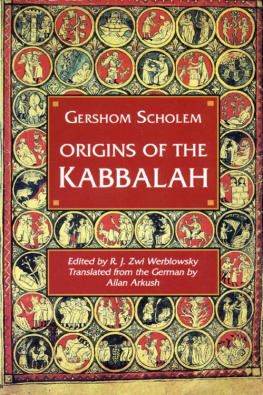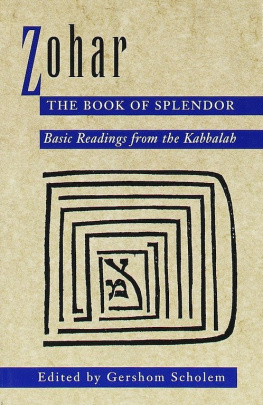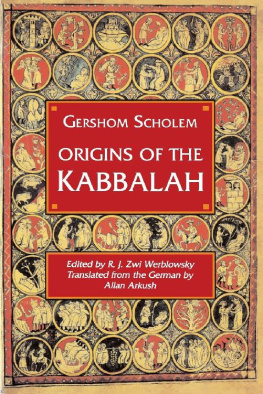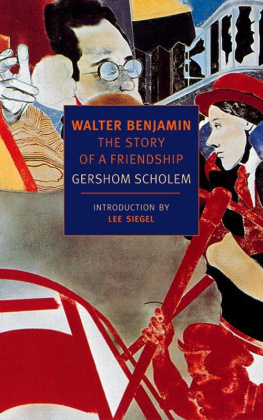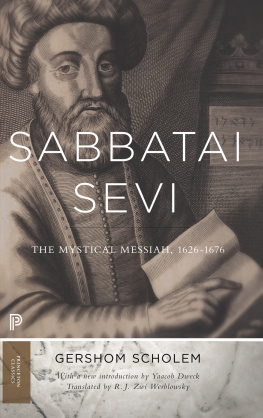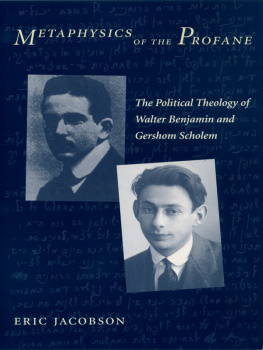Noam Zadoff - Gershom Scholem: From Berlin to Jerusalem and Back (Tauber Institute for the Study of European Jewry)
Here you can read online Noam Zadoff - Gershom Scholem: From Berlin to Jerusalem and Back (Tauber Institute for the Study of European Jewry) full text of the book (entire story) in english for free. Download pdf and epub, get meaning, cover and reviews about this ebook. year: 2017, publisher: Brandeis University Press, genre: Art. Description of the work, (preface) as well as reviews are available. Best literature library LitArk.com created for fans of good reading and offers a wide selection of genres:
Romance novel
Science fiction
Adventure
Detective
Science
History
Home and family
Prose
Art
Politics
Computer
Non-fiction
Religion
Business
Children
Humor
Choose a favorite category and find really read worthwhile books. Enjoy immersion in the world of imagination, feel the emotions of the characters or learn something new for yourself, make an fascinating discovery.
- Book:Gershom Scholem: From Berlin to Jerusalem and Back (Tauber Institute for the Study of European Jewry)
- Author:
- Publisher:Brandeis University Press
- Genre:
- Year:2017
- Rating:5 / 5
- Favourites:Add to favourites
- Your mark:
- 100
- 1
- 2
- 3
- 4
- 5
Gershom Scholem: From Berlin to Jerusalem and Back (Tauber Institute for the Study of European Jewry): summary, description and annotation
We offer to read an annotation, description, summary or preface (depends on what the author of the book "Gershom Scholem: From Berlin to Jerusalem and Back (Tauber Institute for the Study of European Jewry)" wrote himself). If you haven't found the necessary information about the book — write in the comments, we will try to find it.
Noam Zadoff: author's other books
Who wrote Gershom Scholem: From Berlin to Jerusalem and Back (Tauber Institute for the Study of European Jewry)? Find out the surname, the name of the author of the book and a list of all author's works by series.
Gershom Scholem: From Berlin to Jerusalem and Back (Tauber Institute for the Study of European Jewry) — read online for free the complete book (whole text) full work
Below is the text of the book, divided by pages. System saving the place of the last page read, allows you to conveniently read the book "Gershom Scholem: From Berlin to Jerusalem and Back (Tauber Institute for the Study of European Jewry)" online for free, without having to search again every time where you left off. Put a bookmark, and you can go to the page where you finished reading at any time.
Font size:
Interval:
Bookmark:

ACKNOWLEDGMENTS
I wish to thank the teachers, friends, and colleagues who helped me in the different phases of writing this book. To Moshe Zimmermann, Michael Brenner, Itta Shedletzky, Matthias Schmidt, Ada Rapoport-Albert, Rachel Elior, Moshe Idel, David Ruderman, Dan Laor, Jacob Barnai, Richard Cohen, David Myers, John Efron, Jens Malte Fischer, Tilo Schabert, Shaul Magid, Malachi Hacohen, and Eric Jacobson, thank you for discussing different aspects of Gershom Scholems life and work with me, and for helping me sharpen my observations on the complexities of his life.
I am grateful to the friends, colleagues, and students of Scholem who shared with me their memories and insights, especially Jrgen Habermas, Hartmut von Hentig, Mayer Abramowitz, and Avraham Shapira. My gratitude goes also to the archives that opened their doors to me and allowed me to search their collections: the Archives Department at the National Library of Israel, the Central Archives for the History of the Jewish People, the Hebrew University of Jerusalem archive and Oral History Division, and the archive of the Wissenschaftskolleg zu Berlin.
I would also like to thank Ernst Peter Wieckenberg for the friendly way he opened for me a window into the intellectual world in Germany after World War II. My parents, Diana and Efraim Zadoff, and my parents-in-law, Huberta and Richard Triendl, were always ready to help with matters concerning the book.
The English publication of the book was made possible thanks to generous support from the Israel Institute in Washington and the Borns Jewish Studies Program and the History Department at Indiana University. Special thanks go to Jeffrey Green for his accurate and attentive translation, which shows the strong personal interest he took in the book; to Jeanne Ferris for editing the book meticulously and patiently; and to Sylvia Fuks Fried and Eugene Sheppard at Brandeis University Press and Phyllis Deutsch and Ann Brash at University Press of New England for their advice and support.
Finally, my thanks to my dearest of all, Mirjam, Amos, and Emilia, whose support and patience made the writing of this book possible.
AFTERWORD
FROM BERLIN TO JERUSALEM
Scholems Jewish state was founded in Berlin. Although the emphasis is ostensibly on Jerusalem, on the goal, what really lives in this book of memoirs is Berlin, as well as other European cities, the other arche-European cities where Scholem lived in his youth, such as Bern or Munich. But, above all, again and again, Berlin. As if by itself, a kind of hidden struggle between these two cities in Scholems soul arises from the book. It is not conscious: consciously Scholem was entirely dedicated to Jerusalem from the time he adopted political Zionism as a youth. But as long as he dreamed about it, it was the Jerusalem one longs for from the depths of the north, its the Berlin dream of Jerusalem, which is not, for example, similar to the Jerusalem dream about Jerusalem.... In the final analysisindeed in the finality of the final analysisBerlin won, and Jerusalem lost. It is difficult not to recall the rumor that reached my ears, according to which the old Gershom Scholem desired more than anything to live in Berlin and wander in the city of his youth, which no longer existedthus Scholem spent some of the most emotional months of his last year in Berlin, which he had left more than fifty years earlier, in order never to return to it, slamming the door, one might say. And all of this was in order to realize that the true city of his dreamshis Jerusalemwas this rejected Berlin. And this, too, is Scholems rebellion, which eventually rebelled against him.
YORAM BRONOWSKI, MIBERLIN LIYERUSHALIYM UVERCHAZARAH
This book is centered on Scholems attitude toward Germany during the six decades after he moved to Palestine. Although he usually presented himself outwardly as a Zionist who had turned his back on German culture, after World War II his increasing closeness to Germany is noticeablecloseness that at the same time symbolizes a distancing from Israel. His ambivalence regarding a connection with the German intellectual world in the first years after the war was succeeded in time by a desire to be a part of that world. This desire complemented that of German intellectuals to connect with the Jewish heritage of their country that had been characteristic of it during the years before the Holocaust. The peak of this process for Scholem can be seen in the publication of his autobiography in the autumn of his life, which was also the point of departure for the present study. The importance of From Berlin to Jerusalem for understanding Scholems life is in the connection of its beginning to its end. Hence, the final section of this book will be devoted to this work.
The first edition of Scholems autobiography was published in German in 1977, close to the time of his eightieth birthday. An expanded Hebrew edition was published in Israel immediately after his death in 1982. And why did he write the book in German and publish it first in Germany?
When the book was published, Scholem had already decided he would not write a sequel. In a letter to the editor of the Germania Judaica series in Bonn, Jutta Bohnke-Kollwitz, he explained his decision: While its nice that my book
The clear picture, easily presented to the German public, altered shortly after Scholems arrival in the Land of Israel, and this prevented him from documenting his later life. These changes, discussed at length in the first two parts of this book, caused him to become disappointed with the path of Zionist and its manner of implementation. This disappointment was caused by the gap between the Zionist utopia in Scholems imagination and the reality that developed over the years. Any effort to implement a utopian idea naturally contains the seeds of disappointmentfor no reality, as ideal as it might appear, can compete with the manner in which it was dreamed. In this sense, disappointment was a necessary component of the process of all immigration motivated by the Zionist ideology, and it has been shared by many immigrants from the time of the First Aliyah to the present. In addition, there was Scholems political and cultural worldview, which ran counter to the direction of the Yishuv and the State of Israel, causing a widening rift between him and them.
After the riots of 1929, which made it clear to Scholem that the Yishuv intended to establish a society very different in character from what he had imagined and hoped for, and after the immediate need created by the persecution of the Jews and the Holocaust finally set the path for territorial Zionism,
In the spring of 1981 Tiedemann met Scholem in Germany again. In the background was the crisis between Begin and Chancellor Helmut Schmidt following his statements in Riyadh. Evidently Scholem sought to avoid recounting the history of this despair by interrupting the story of his life for the German reader (and several years later for the Hebrew reader as well) a few years before the first great crisis, in 1929. Nevertheless, the question remains: Why did he try to avoid it? Here is the place to ask the second question again: Why did Scholem choose to write his book in German and publish it in Germany first?
In the light of Scholems reception in Germany, we may assume that the great interest that the story of his life aroused in the rediscovery of a lost territory for German culture encouraged him to put his memories in writing. As early as Here is what he wrote:
In 1923 I went to Palestine, which we then referred to with the translation of the Hebrew term, Eretz-Yisrael, the Land of Israel. Until 1930 I retained a connection with my mother tongue. In 1933 I lost that connection with it and did not experience or suffer the German language at that stage, which Hitler brought with him. And thus I remained. When I write German now and then, I am an
Next pageFont size:
Interval:
Bookmark:
Similar books «Gershom Scholem: From Berlin to Jerusalem and Back (Tauber Institute for the Study of European Jewry)»
Look at similar books to Gershom Scholem: From Berlin to Jerusalem and Back (Tauber Institute for the Study of European Jewry). We have selected literature similar in name and meaning in the hope of providing readers with more options to find new, interesting, not yet read works.
Discussion, reviews of the book Gershom Scholem: From Berlin to Jerusalem and Back (Tauber Institute for the Study of European Jewry) and just readers' own opinions. Leave your comments, write what you think about the work, its meaning or the main characters. Specify what exactly you liked and what you didn't like, and why you think so.

